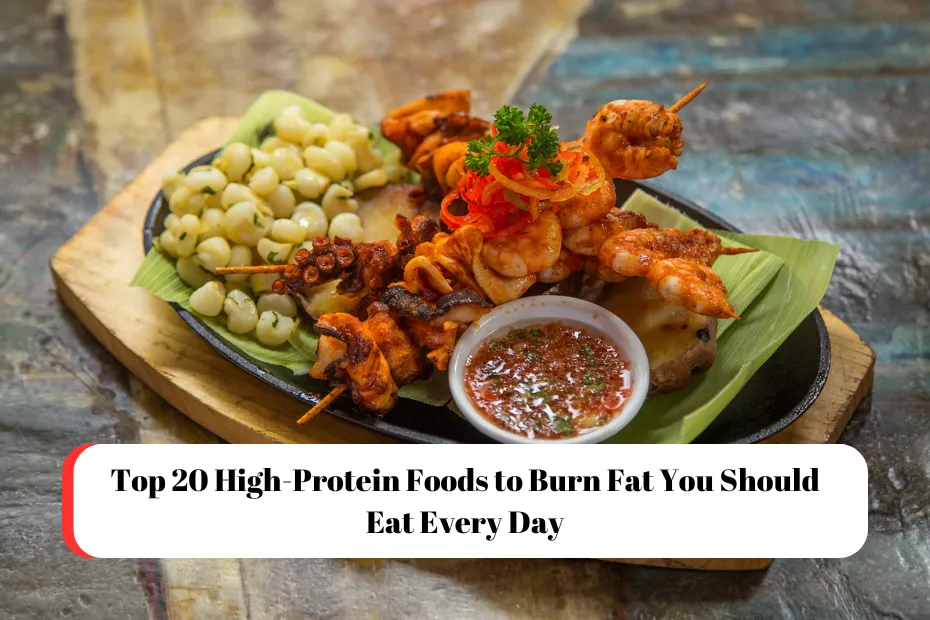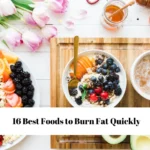In today’s health-conscious world, the quest for effective fat-burning strategies has led many to explore the benefits of high-protein diets. Protein is not only vital for muscle repair and growth but also plays a crucial role in enhancing metabolism and promoting satiety. By incorporating high-protein foods into your daily meals, you can significantly increase your chances of burning fat while enjoying a variety of delicious options.
In this article, we present the Top 20 High-Protein Foods to Burn Fat You Should Eat Every Day, offering you practical choices that are both nutritious and satisfying. From lean meats to plant-based sources, these foods can help you achieve your weight loss goals while nourishing your body. Let’s dive into this comprehensive list to discover the best high-protein foods that can transform your diet and aid in your fat-burning journey.
1. Chicken Breast
Chicken breast is a staple in many high-protein diets due to its impressive protein content and versatility. A 100-gram serving of cooked, skinless chicken breast contains approximately 31 grams of protein and only about 165 calories. This lean source of protein is low in fat and can be prepared in numerous ways—grilled, baked, stir-fried, or added to salads.
Consuming chicken breast regularly can help boost your protein intake while keeping calorie counts low, making it easier to maintain a caloric deficit for weight loss. Moreover, the amino acids found in chicken are essential for muscle repair and growth, making it a preferred choice for fitness enthusiasts.
2. Greek Yogurt
Greek yogurt is another high-protein food that has gained popularity in recent years, especially among health-conscious individuals. A typical serving of plain Greek yogurt (about 200 grams) can contain around 20 grams of protein, along with probiotics that support gut health. The thick texture of Greek yogurt makes it a satisfying snack or a base for smoothies, parfaits, and dressings.
Its high protein and low carbohydrate content can help keep you feeling fuller for longer, reducing the likelihood of unhealthy snacking. Additionally, Greek yogurt is rich in calcium, which is essential for bone health, making it a nutritionally dense food that complements a fat-burning diet.
3. Eggs
Eggs are a nutritional powerhouse, packed with protein, healthy fats, and essential vitamins and minerals. One large egg contains about 6 grams of protein and various nutrients, including vitamin D and choline. The protein in eggs is of high biological value, meaning your body can utilize it effectively. Eating eggs for breakfast can help improve satiety and reduce calorie intake later in the day.
Research suggests that incorporating eggs into your diet may lead to better weight management and fat loss outcomes. They can be prepared in many ways boiled, scrambled, poached, or as part of an omelet making them a versatile option for any meal.
4. Lentils
Lentils are an excellent source of plant-based protein, particularly beneficial for vegetarians and vegans. A cooked cup of lentils contains about 18 grams of protein, along with 15.6 grams of fiber, which promotes digestive health and keeps you feeling full. Lentils are low in fat and provide various vitamins and minerals, including iron and folate.
Their high fiber content can help stabilize blood sugar levels, preventing spikes and crashes that lead to cravings. Incorporating lentils into soups, salads, and stews is an easy way to enhance the protein content of your meals while adding flavor and texture.
5. Cottage Cheese
Cottage cheese is a versatile and nutrient-rich dairy product that is high in protein and low in fat. A 200-gram serving can provide around 25 grams of protein while being relatively low in calories, making it an ideal food for those looking to lose fat. Cottage cheese is rich in casein protein, which is digested slowly, providing a steady release of amino acids into the bloodstream.
This slow digestion can promote muscle retention and satiety, making it an excellent choice for a nighttime snack. You can enjoy cottage cheese plain or mix it with fruits, nuts, or seeds for added flavor and nutrients.
6. Quinoa
Quinoa is a unique grain that is considered a complete protein because it contains all nine essential amino acids. One cooked cup of quinoa provides about 8 grams of protein and is also rich in fiber, making it a nutritious addition to any meal. Quinoa is gluten-free and contains various vitamins and minerals, including magnesium, phosphorus, and manganese.
Its high fiber content aids digestion and contributes to a feeling of fullness, which can help control hunger. Quinoa can be used as a base for salads, stir-fries, or served as a side dish, offering a versatile option for those looking to increase their protein intake.
7. Tofu
Tofu, made from soybeans, is a popular protein source for those following a plant-based diet. A 100-gram serving of firm tofu contains approximately 18 grams of protein and is low in calories. Tofu is versatile and can absorb the flavors of the ingredients it is cooked with, making it suitable for a variety of dishes.
Additionally, tofu is a good source of calcium and iron, contributing to overall health. The protein in tofu supports muscle retention, especially when combined with regular exercise. Whether stir-fried, grilled, or blended into smoothies, tofu is an excellent addition to a fat-burning diet.
8. Salmon
Salmon is a fatty fish that is not only rich in protein but also packed with omega-3 fatty acids, which are beneficial for heart health. A 100-gram serving of salmon contains about 25 grams of protein and is known for its anti-inflammatory properties.
Omega-3 fatty acids can also help reduce body fat, particularly abdominal fat, making salmon a great choice for those looking to burn fat. Grilling, baking, or poaching salmon allows you to enjoy its rich flavor while reaping its health benefits. Including salmon in your diet can help maintain muscle mass and promote overall well-being.
9. Chickpeas
Chickpeas, or garbanzo beans, are a fantastic plant-based protein source, offering about 15 grams of protein per cooked cup. They are also rich in fiber, which aids digestion and helps maintain stable blood sugar levels. The combination of protein and fiber in chickpeas can help control appetite and reduce overall calorie intake, supporting weight loss efforts.
Chickpeas can be incorporated into salads, stews, or made into hummus, providing versatility in your meals. Additionally, they are packed with essential nutrients such as iron, magnesium, and folate, making them a nutritious option for any diet.
10. Turkey Breast
Turkey breast is another lean source of protein, providing about 29 grams of protein per 100-gram serving. This low-fat meat is an excellent choice for those aiming to increase their protein intake without consuming excess calories.
Turkey breast can be grilled, roasted, or used in sandwiches and salads, offering versatility in meal preparation. It is also rich in B vitamins, which play a vital role in energy metabolism. Including turkey breast in your diet can help with muscle repair and growth while supporting fat loss by promoting satiety and reducing cravings.
11. Almonds
Almonds are not only a good source of healthy fats but also contain a significant amount of protein. A one-ounce serving (about 28 grams) provides approximately 6 grams of protein and is rich in fiber and vitamin E. Almonds can help control appetite, making them a great snack option for those looking to lose weight.
While they are calorie-dense, consuming them in moderation can contribute to a balanced diet and provide essential nutrients. Almonds can be enjoyed raw, roasted, or as almond butter, adding a nutritious and satisfying element to smoothies, oatmeal, or baked goods.
12. Beef Jerky
Beef jerky is a high-protein snack that is convenient and portable, making it a great option for those on the go. A typical serving of beef jerky (about 28 grams) contains approximately 10-15 grams of protein, depending on the brand. It is low in carbohydrates and fat, making it a suitable option for low-carb diets.
When choosing beef jerky, opt for varieties that are low in sodium and added sugars. Beef jerky can satisfy cravings for something savory while providing a protein boost, making it an ideal snack for supporting fat loss and muscle maintenance.
13. Edamame
Edamame, young soybeans, are an excellent source of plant-based protein, providing about 17 grams of protein per cooked cup. They are also rich in fiber and essential nutrients, including folate and vitamin K. Edamame can be enjoyed as a snack, added to salads, or incorporated into stir-fries, making them a versatile addition to your diet.
The protein and fiber content in edamame can help promote satiety and control appetite, supporting fat loss efforts. Additionally, the antioxidants found in edamame may help reduce inflammation and support overall health.
14. Whey Protein
Whey protein is a highly concentrated protein derived from milk, commonly used in supplements and protein powders. It provides a convenient way to boost protein intake, with one scoop typically containing around 20-25 grams of protein.
Whey protein is quickly absorbed by the body, making it an ideal post-workout supplement to support muscle recovery and growth. Incorporating whey protein into smoothies, shakes, or baked goods can help enhance your overall protein intake while aiding in fat loss by promoting satiety and reducing cravings for unhealthy snacks.
15. Pumpkin Seeds
Pumpkin seeds, also known as pepitas, are nutrient-dense and high in protein, offering about 9 grams of protein per ounce (28 grams). They are also a rich source of healthy fats, fiber, and essential minerals, including magnesium and zinc.
The combination of protein and healthy fats in pumpkin seeds can help keep you satisfied, making them a great snack option for weight management. Pumpkin seeds can be eaten raw, roasted, or added to salads, oatmeal, or yogurt, providing a crunchy texture and nutritious boost to your meals.
16. Shrimp
Shrimp is a low-calorie seafood option that is high in protein, providing around 24 grams of protein per 100 grams. This versatile shellfish is also rich in essential nutrients, including selenium, vitamin B12, and iodine.
Shrimp can be cooked in various ways grilled, steamed, or sautéed and is quick to prepare, making it an excellent addition to salads, stir-fries, or pasta dishes. Including shrimp in your diet can support muscle retention and promote fat loss due to its high protein content and low calorie count.
17. Chia Seeds
Chia seeds are tiny, nutrient-packed seeds that are high in protein and fiber. One ounce (about 28 grams) provides approximately 5 grams of protein and an impressive 11 grams of fiber. Chia seeds can absorb water and expand in the stomach, promoting feelings of fullness and helping to control appetite.
They are also rich in omega-3 fatty acids, which are beneficial for heart health. Chia seeds can be added to smoothies, yogurt, or oatmeal, or used to make chia pudding, providing a nutritious and satisfying addition to your meals.
18. Seitan
Seitan, made from wheat gluten, is a popular meat substitute for vegetarians and vegans. It is exceptionally high in protein, providing about 25 grams of protein per 100 grams. Seitan has a chewy texture, making it an ideal replacement for meat in various dishes.
It is low in carbohydrates and can absorb flavors well, allowing for diverse meal preparations. While it is a great protein source, individuals with gluten sensitivities or celiac disease should avoid it. Incorporating seitan into stir-fries, sandwiches, or salads can help increase protein intake while maintaining a low-calorie diet.
19. Fish
Fish, in general, is a fantastic source of high-quality protein and healthy fats. Varieties like cod, tuna, and tilapia provide approximately 20-25 grams of protein per 100 grams while being low in calories. Fish is also rich in omega-3 fatty acids, which have been linked to reduced inflammation and improved heart health.
Eating fish can support muscle maintenance and fat loss, making it an excellent choice for those aiming to burn fat. Incorporating fish into your diet a couple of times a week can provide essential nutrients and promote overall health.
20. Spinach
While not traditionally viewed as a high-protein food, spinach deserves a mention due to its impressive nutrient profile. One cup of cooked spinach contains about 5 grams of protein and is low in calories. Spinach is also rich in vitamins A, C, K, and several minerals, including iron and calcium.
The high fiber content of spinach aids digestion and promotes satiety, making it easier to maintain a healthy weight. Spinach can be used in salads, smoothies, soups, or as a side dish, offering versatility and nutrition to your meals.
Conclusion
Incorporating high-protein foods into your daily diet can be a game changer in your weight loss journey. The Top 20 High-Protein Foods to Burn Fat You Should Eat Every Day not only provide essential nutrients but also enhance your metabolism and keep you feeling full longer.
By making informed choices and diversifying your protein sources, you can create satisfying meals that support your fat-burning goals. Whether you’re a meat lover, a vegetarian, or someone looking for nutritious snacks, this list offers something for everyone. Embrace these foods and take a step closer to a healthier, leaner you.
FAQs
1. What are the benefits of high-protein foods for fat loss?
High-protein foods help increase satiety, reduce cravings, and boost metabolism, making it easier to maintain a caloric deficit essential for fat loss.
2. Can I get enough protein from plant-based sources?
Yes, many plant-based foods like lentils, chickpeas, quinoa, and tofu are excellent protein sources, making it easy for vegetarians and vegans to meet their protein needs.




